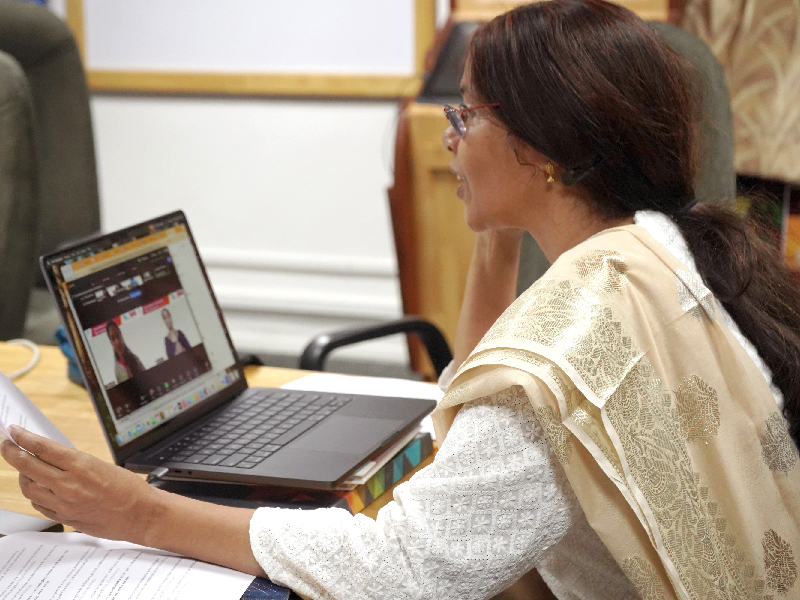Programs
- M. Tech. in Automotive Engineering -Postgraduate
- Master of Physician Associate (M.PA) – (Medicine, Surgery) 2 Year -Postgraduate

On the occasion of the International Day of Sign Languages, 23rd September 2025, the UNESCO Chair on Assistive Technologies in Education (ATE), Amrita CREATE, and School of Computing, Amritapuri, organized a webinar titled “Advancing Indian Sign Language: Interpretation, Technology, and Inclusive Education” which aligns with this year’s theme, “No Human Rights Without Sign Language Rights.”
The webinar celebrated sign languages as an essential part of global linguistic and cultural diversity, highlighting the vital role of Indian Sign Language (ISL) in advancing education, empowerment, and inclusion. It brought together leading academics and experts to explore the significance of sign language, the impact of technology, and the advantages of bilingual education in making learning truly inclusive for Deaf and hard-of-hearing (DHH) students.
Dr. Prema Nedungadi, UNESCO Chairholder on Assistive Technologies in Education, Associate Dean at the School of Computing (Amritapuri), and founding Director of Amrita CREATE, moderated a panel on innovations in bilingual education and the future of ISL in policy and practice. Dr. Nedungadi invited experts to share key challenges, opportunities, and collaborative pathways for advancing this field.
The expert panelists were:
Ms. Anu Menon, an experienced Indian Sign Language (ISL) expert and ISL signer with CREATE, shared how learning sign language opened new horizons for her and emphasized the need for greater societal acceptance and recognition of sign languages.
Dr. Vaishali Kolhe spoke on disability inclusion and higher education policy, stressing the need for advanced curricula to train ISL interpreters in technical fields such as engineering and computer science. She highlighted the importance of ensuring interpreters are well-equipped to support Deaf students and accurately interpret complex academic content.
Dr. Varsha Gathoo addressed the inclusion of Deaf and Hard-of-Hearing (DHH) children, calling for advanced ISL training programs and stronger teacher self-efficacy in inclusive education. She urged educators to adopt Universal Design for Learning (UDL) principles and to rethink the traditional role of special educators.
Dr. Raji Gopal discussed ISL in higher education and early intervention, pointing out literacy challenges among Deaf students due to limited bilingual education before college. She advocated for ISL-medium or bilingual schools from early years and highlighted NISH’s dual-language programs for preschoolers and parents, noting the continued lack of such schools in Kerala.
Ms. Pallavi Kulshrestha emphasized early language access for Deaf children, underscoring that exposure to a fully accessible language—preferably sign language—is essential for cognitive development. She called for greater use of technology, including real-time interpretation systems and awareness tools, to promote inclusion and equal rights.
Ms. Dove Paisley (Sankari) shared insights from an interpreter’s perspective, noting the shortage of qualified interpreters, particularly in rural areas. She discussed the potential of Video Relay Interpreting (VRI) in professional and academic settings but cautioned against its use in hands-on or visual learning contexts. In healthcare, she stressed, in-person interpretation remains vital for accuracy and patient safety.
Ms. Sharayu Kadam discussed the challenges Deaf learners face in acquiring English due to limited exposure. Since English proficiency is key to higher education and employment, she recommended English Development Programs that blend ISL and English grammar, alongside Faculty Development Programs to train educators in effective methodologies for Deaf learners.
The keynote address by Dr. Ulrike Zeshan, Linguist and Head of Happy Hands School for the Deaf, and Adjunct Professor at the University of Central Lancashire, UK, focused on ISL Capacity Building in Education. She emphasized that sign language is a rich, structured medium central to Deaf empowerment. While ISL recognition has advanced, Dr. Zeshan highlighted the ongoing need to strengthen Deaf education and teacher training, integrating human expertise, inclusive pedagogy, and AI-driven tools to enhance accessibility and learning outcomes.
Together, these discussions reaffirmed the shared commitment to SDG 4 (Quality Education) and SDG 10 (Reduced Inequalities)—highlighting the pivotal role of technology and innovation in creating inclusive learning environments and strengthening pathways to disability inclusion, ensuring equitable opportunities for all learners.
Watch the webinar here